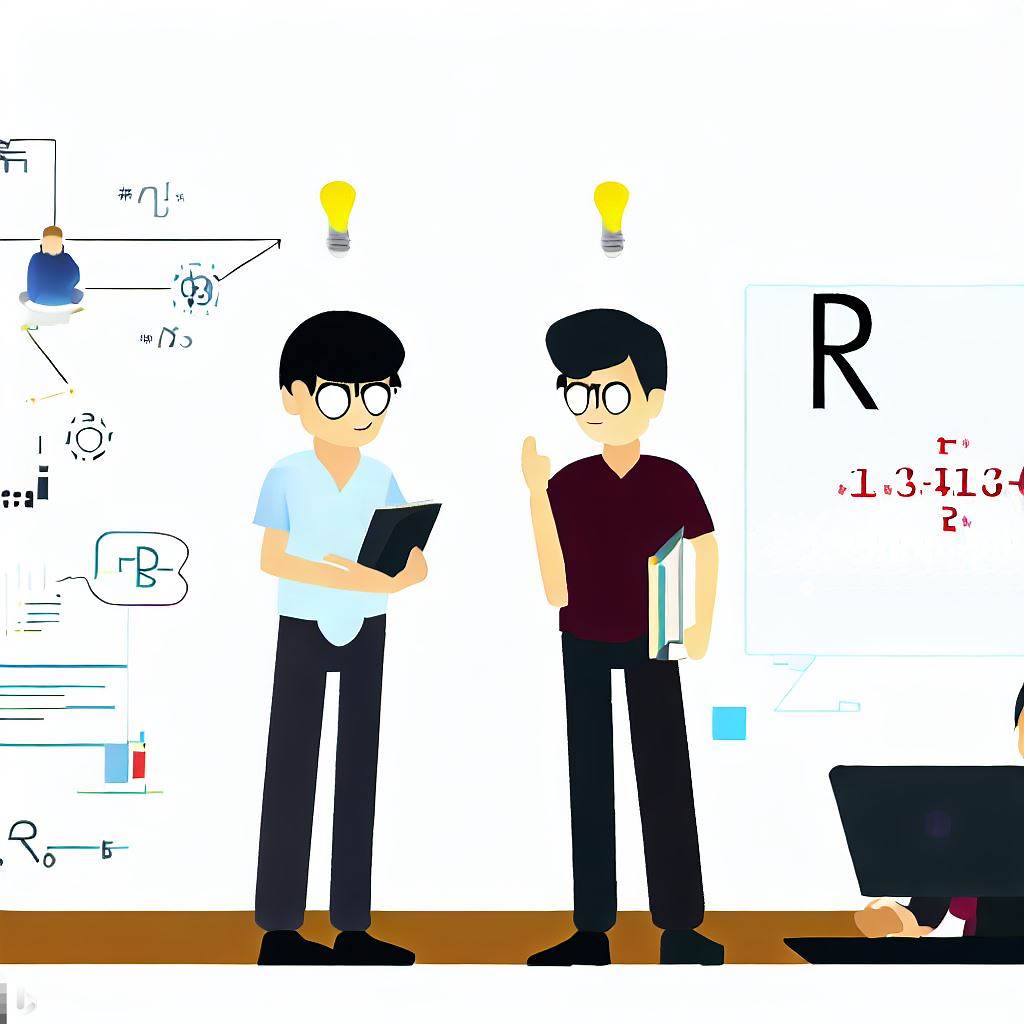An In-Depth Look into What Your Professor Expects from You - Depicting a Complete Understanding of the R Programming Assignment

Students may find it challenging and complex to begin a R programming assignment. In order to demonstrate a thorough understanding of the subject matter, it is imperative that you comprehend what your professor expects from you. This blog post aims to give you knowledge of your professor's expectations as well as tips on how to successfully meet them.
Professors expect their students to be proficient in both theory and practice in order to succeed in the academic world. Your professor wants proof that you can help with R Programming to solve complex problems. This requires you to demonstrate your command of fundamental programming concepts, data manipulation strategies, and effective code implementation. It goes beyond merely finishing the task.
Although there aren't any set guidelines to follow, this blog post will walk you through the crucial components of fulfilling your professor's expectations. We'll talk about things like understanding assignment requirements, showcasing mastery of R programming concepts, writing effective, well-organized code, providing thorough comments and documentation, and thoroughly testing and handling errors.
By fully comprehending these requirements, you can assignments with assurance, knowing that you are on the right track to impress your professor and perform exceptionally in your coursework.

Skills for Solving Issues:
Strong problem-solving abilities are one of the key qualities your professor expects from you when it comes to R Programming assignments. An effective R programmer is able to analyze challenging issues and come up with workable solutions using the R programming language. Possessing strong problem-solving skills demonstrates not only your command of the material, but also your capacity for critical thought and logical approach to programming problems.
It's critical to pay close attention to detail and fully comprehend the requirements of the given problem in order to solve problems effectively. This entails carefully reading the assignment prompt, determining the precise issue that must be resolved, and crystallizing the intended result. The next step is to divide the issue into more manageable pieces once you have a firm grasp on it.
It is simpler to implement a solution when a complex problem is broken down into smaller subproblems that allow you to address each element separately. Finding patterns or relationships within the problem and developing an algorithmic strategy to solve each subproblem are frequent steps in this process. Your ability to dissect complex issues demonstrates your analytical abilities and convinces your professor that you have a methodical approach to solving programming problems.
Use the proper R programming constructs and techniques when putting your solution into practice. This could involve iterating over data or making decisions based on predetermined conditions using control structures like loops and conditional statements. It's also essential to comprehend and use R's built-in functions and libraries if you want to solve problems effectively.
Additionally, your professor will anticipate that you will produce clear, concise, and effective code. Writing code that is simple to read and understand demonstrates your ability to effectively communicate your solutions. This involves structuring your code, using meaningful variable and function names, and following coding best practices.
Implementing Code Effectively:
Your professor will be looking for efficient code implementation from you in your R Programming assignments. Optimizing algorithms and data structures to achieve desired functionality while reducing computational resources and execution time is a key component of writing efficient code. By concentrating on code efficiency, you not only show off your programming prowess, but also your capacity to develop scalable, high-performing solutions.
The design of algorithms is essential to writing effective code. It entails deciding which data structures and algorithms are best suited to solve the given problem. Making educated choices regarding the choice of algorithms is facilitated by having a solid understanding of the concepts of time complexity and spatial complexity. You can increase the effectiveness of your code by selecting algorithms with lower time and space complexities.
When aiming for efficient code implementation, code optimization is another factor to take into account. It entails using R's built-in functions and libraries, minimizing redundant operations, and avoiding pointless iterations. Your code can be streamlined and made more effective by determining and removing pointless code segments or by improving the execution flow. The performance of your code can also be greatly improved by utilizing vectorization techniques, such as applying operations to entire arrays or matrices rather than individual elements.
Efficiency in memory management is also essential for code. To prevent memory leaks and unnecessary memory consumption in R, it's crucial to allocate and release memory in the right amounts. Utilizing strategies like recycling and preallocation, as well as being aware of how R manages memory, can help optimize memory usage and boost code performance.
Your code must be profiled and benchmarked in order to find performance bottlenecks and areas that need to be optimized. You can examine the execution time and resource usage of various parts of your code by using R's profiling tools. This enables you to identify ineffective sections and effectively concentrate your optimization efforts.
Another technique for increasing R's code efficiency is parallel processing. Utilizing R's parallel computing features allows you to split computations across a number of cores or machines, speeding up the execution of computationally demanding tasks.
Statistical Analysis Methods:
Data analysis is a key component of R programming assignments, and your professor expects you to use R's extensive libraries and packages to show that you are proficient in a variety of data analysis techniques. Extraction of meaningful insights and making decisions based on the data require the ability to manipulate and interpret data sets accurately.
A fundamental skill in data analysis is data manipulation. Your professor wants you to demonstrate how you can use R functions and packages to clean, transform, and reshape data. Filtering rows, choosing columns, merging datasets, handling missing data, and working with categorical variables are a few examples of the tasks that fall under this category. When manipulating data effectively, mastery of functions like subset(), filter(), mutate(), and aggregate() is essential.
Another area where your professor expects you to show proficiency is in statistical analysis. You can reach conclusions and make data-driven decisions by using statistical techniques in R. This entails performing regression analysis, generating descriptive statistics, and investigating the relationships between various variables. Stats, dplyr, and ggplot2 are just a few of the many packages that R offers to make statistical analysis and data visualization easier.
The use of machine learning for data analysis has become extremely popular. Your professor wants you to demonstrate how well you know how to use R to implement machine learning algorithms. This includes activities like preprocessing data, developing and testing models, and making predictions. You can use different machine learning algorithms, such as decision trees, random forests, and support vector machines, to solve real-world problems if you are proficient with packages like caret and randomForest.
The effective communication of insights through visual representations is something your professor expects you to do. Data visualization is a crucial component of data analysis. You can make insightful and aesthetically pleasing plots, charts, and graphs using R's strong visualization packages like ggplot2 and plotly. To meet your professor's expectations, you must be able to select the right visualizations, alter their appearance, and clearly communicate the information they represent.
EDA, or exploratory data analysis, is a crucial step in comprehending and condensing data. Your professor is counting on you to use R's EDA features. This calls for activities like data profiling, pattern and trend detection, outlier detection, and variable distribution analysis. Using tools like summary(), hist(), and boxplot() allows for the extraction of insightful knowledge from the data.
Practices for Documentation:
Effective documentation is a key component of R Programming assignments, and your professor expects you to show that your work is documented in a clear, thorough manner. Well-documented code and supporting documentation make it easier for others to collaborate with you, understand your thought process, and ensure that your work can be replicated.
Code A crucial part of documentation are comments. Your instructor anticipates that you will annotate your code with insightful remarks that describe the intent and functionality of each section. Comments should describe any assumptions made during development, highlight key points, and offer insights into the reasoning behind complex operations. Well-written comments make code easier to read and clarify its functionality for you and other readers.
The Readme Files serve as an introduction to your project and a manual for users or other programmers. Your professor anticipates you to submit a thorough readme file that outlines the goal and scope of your project, clarifies the file structure and hierarchy, and offers guidance on how to execute your code. Mention any dependencies or outside libraries that are necessary for your project to run properly.
The naming of variables and functions is a crucial part of documentation. Your professor expects you to give your variables and functions names that are meaningful and evocative. Variable and function names should be clear and easy to understand. Avoid using obscure acronyms or variable names with just one letter. Use names that accurately describe the function or purpose of the variable instead.
Understanding how data is organized and used in your code depends on the documentation of data structures. Arrays, matrices, and data frames are examples of complex data structures that your professor expects you to document. Give details on the data types and units used as well as the meaning of each column and field. This aids others in understanding the organization and content of the data contained in your code.
When using third-party libraries or packages in your code, documentation of External Libraries and Packages is crucial. Your professor expects you to give details on the objectives and capabilities of the libraries or software applications used. Include information about the versions used and any special setup or configuration needed to use them efficiently.
Revision History and Version Control are also crucial components of documentation. Your professor anticipates that you will use Git or another version control system and keep track of the changes you make to your code. Keeping a thorough revision history promotes collaboration with team members or potential contributors and improves traceability.
Conclusion:
In conclusion, completing R programming assignments that meet your professor's expectations is a complex process that necessitates a thorough knowledge of the material. You can show off your knowledge and academic prowess by fully understanding the assignment requirements, showcasing proficiency in R programming concepts, implementing effective and well-structured code, providing thorough comments and documentation, conducting thorough testing and error handling, and more. Keep in mind that every assignment is a chance for you to learn and to show off your skills. Accept the challenge, ask for clarification when necessary, and make use of the tools at your disposal, such as online forums, tutorials, and peer discussions. Your success in R programming assignments will be significantly influenced by your commitment to continuous improvement and the development of a growth mindset.Honing your R programming skills and comprehending your professor's expectations will become second nature as you move forward in your academic career. Accept learning as a process, keep working at it, and never be afraid to ask for help when you need it. You can successfully complete R programming assignments and succeed in your academic endeavors if you put forth the necessary effort and have a solid understanding of your professor's expectations.